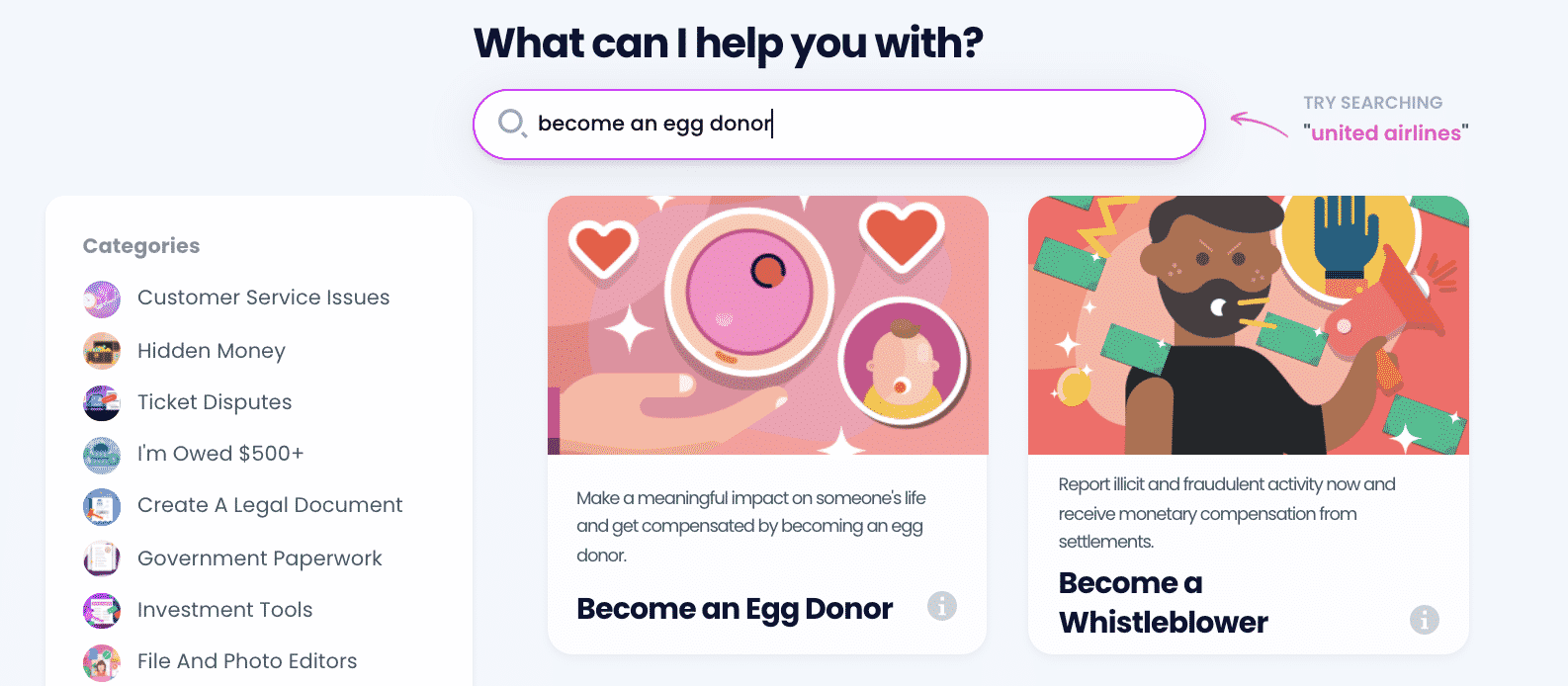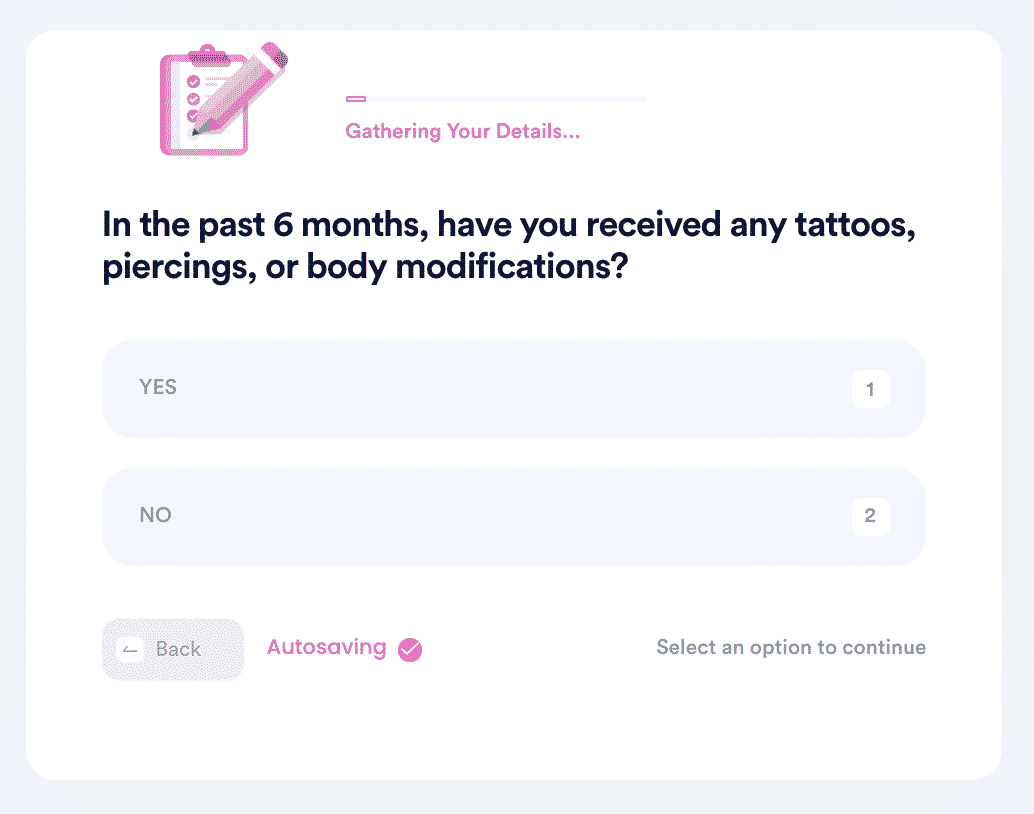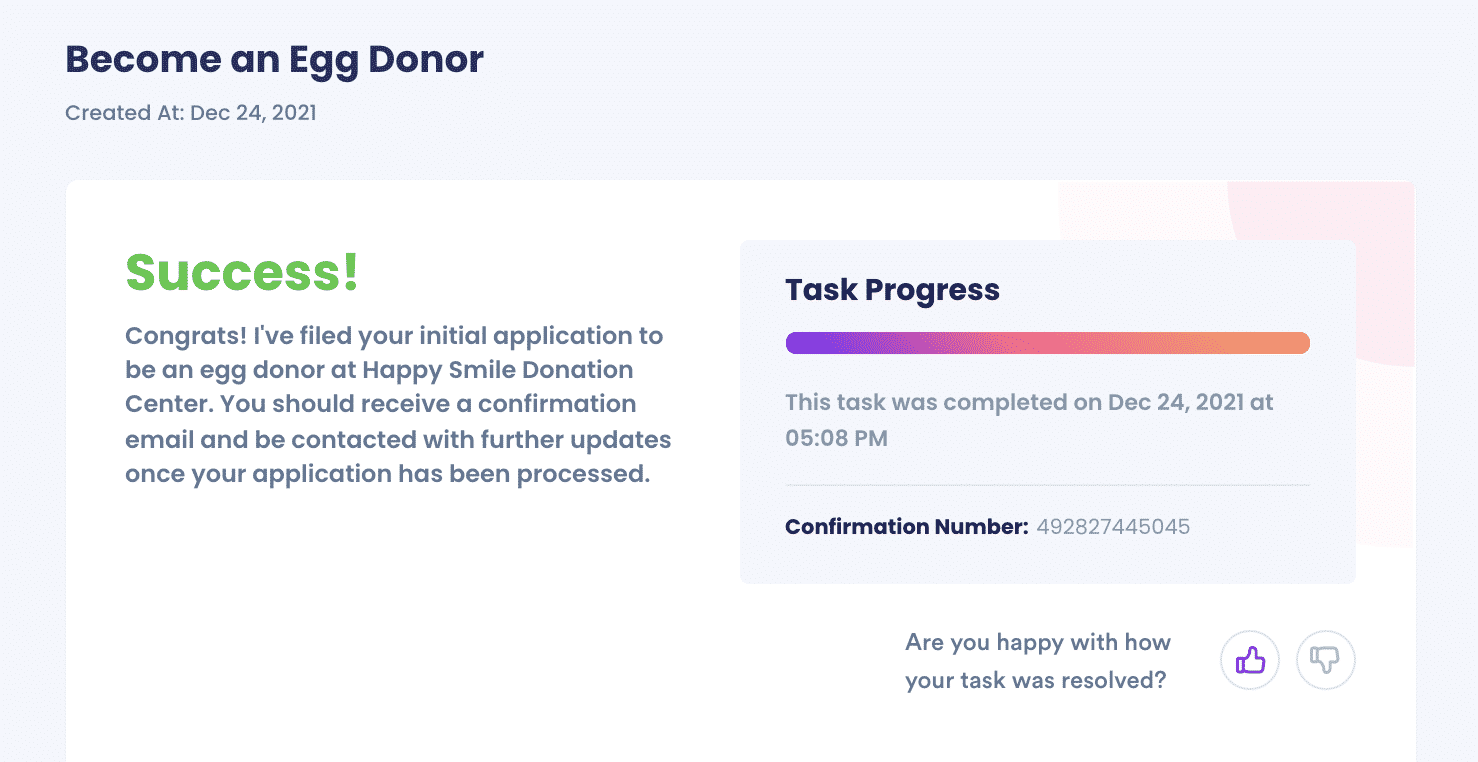How Much Do Egg Donors Get Paid?
If you're donating an egg for monetary reasons, you're probably interested in learning more about . Usually, egg donors earn between $5,000 and $10,000 per cycle, but this varies depending on factors like exceptional quality, previous cycle, the agency, etc.
Several things can disqualify you as a potential egg donor. Health concerns, lifestyle habits, usage of certain contraceptives, and inability to schedule appointments are common reasons people don't qualify to donate. You'll also need to send applications to several agencies to increase your chances of being accepted. DoNotPay can help you navigate the process.
DoNotPay has been helping people become egg donors across the US for years. We can apply to multiple egg donor agencies on your behalf to maximize your chances of being accepted as an egg donor. We'll also help you learn about the egg donation process, egg donor pay, and egg donor requirements – all with a few clicks of a button.
What Is Egg Donation?
Egg donation is when a fertile woman (donor) gives her eggs to another woman (recipient) to help her conceive. It involves a doctor extracting eggs from the donor, fertilizing them in a lab, and transferring the resulting embryos to the recipient's uterus.
Egg donation allows you to help those who wish to conceive, and at the same time, with the right agency, you can be fairly .
What Does the Egg Donating Process Look Like?
The egg donation process involves a range of steps, including:
Initial Screening
This involves a series of screening procedures, like:
| Fertility screening | The donor goes through pelvic, physical, and blood tests to determine whether their ovaries can produce eggs. She may also undergo a vaginal sonogram on the second and third day of menstruation to test ovarian reserve and function. |
| Medical screening | The donor goes through tests to determine infectious diseases, drug use, blood type, and general health. |
| Psychological screening | The donor speaks to a psychologist to ensure she's aware of the benefits and risks of egg donation. |
| Genetic screening | The doctor evaluates family history to determine whether there's a possibility of congenital or hereditary disorders. |
Cycle Synchronization
To begin the egg donation cycle:
1. The doctor puts the donor on a birth control pill to synchronize their cycles to the recipient's cycles.
2. The donor gets a vaginal sonogram after the third week of her cycle and starts daily self-injections of Lupron hormones for 7 to 14 days. For egg follicles ' growth, she will also self-inject follicle-stimulating hormone for 8 to 10 days.
3. During this time, the doctor keeps a keen eye on the donor to ensure the follicles are growing and within an appropriate and healthy range.
4. The donor goes through another STI screening.
Retrieval
Once the egg follicles mature:
- The doctor administers an HCG injection to prepare the donor's ovaries to release the eggs.
- Thirty-six hours later, egg retrieval takes place under sedation. The doctor inserts a transvaginal ultrasound device into each mature follicle to retrieve each egg. The entire process takes around 30 minutes. But the donor will be observed for one or two hours after the procedure before they can go home.
Post-retrieval
The donor can resume their everyday lives. They, however, will need to avoid strenuous exercises or activities.
Note: For frozen transfers, the embryos are frozen and transferred into the recipient's body later. Doctors may opt for frozen transfers when they need to run a preimplantation genetic screening for aneuploidy.
Egg Donor Eligibility and Requirements
Not everyone qualifies to donate her eggs. Candidates must:
- Be a female between ages 20 and 34.
- Be in good health, both emotionally and physically.
- Have a Body Mass Index between 19 and 25.
- Have regular monthly menstrual cycles.
- Have both ovaries.
- Have not smoked cigarettes in the past 12 months.
- Not be using some form of birth control.
- Refrain from getting any body piercing or tattoos within six months before initiating an egg donation and while undergoing.
- Be able to make a 3 to 5-month commitment to being an egg donor.
- Be willing to take injections.
- Be well educated (minimum high school degree).
These requirements may vary from site to site. So it's best to do your research before sending your applications.
How to Choose an Egg Donor Agency
Egg donor agencies are not created equally. Some are better than others. Therefore, connecting with the right one could mean the difference between having a stressful, challenging experience and an amazing one. Here are a few things to consider when choosing the right egg donor agency for you:
- Compensation: A good agency should pay well for donations.
- Expenses covered: Take time to consider which expenses they're covering.
- Location: Find out whether they have location restraints.
- Donation frequency: Find out how many times you can donate – reputable ones only allow up to six times, as per the American Society for Reproductive Medicine requirements.
- Ethnicity/Race: If any, consider donor agencies specializing in specific races/ethnicities.
- Time commitment: Consider your availability and whether it aligns with the agency's time commitment needs.
How Much Do Egg Donors Get Paid
Donors often get compensation of between $5,000 and $10,000 per cycle for their time and effort. But a donor might make more if they have outstanding qualities that are difficult to find. Some pay better than others do. They may also cover expenses like travel, meals, airfare, and ground transportation for you and a companion if you bring one. This payment isn't dependent on the outcome but varies from one agency to another.
Get Egg Donor Pay by Yourself
Before you're paid as an egg donor, you have to:
- Make applications to become an egg donor.
- The agency reviews your application.
- You're added to their donor database if it goes through, where intended parents can select you.
- You go through medical screening.
- Paperwork is done to legalize the egg donation process.
- You begin the injections needed to enable egg retrieval.
- The actual egg retrieval happens.
The egg donation process is not as straightforward as you'd like it to be. You have to send applications to multiple agencies, which is time-consuming and draining. On top of that, you'll need to research the agencies that accept applications in your area or ones that you meet their eligibility requirements. Add that to the stress of not being familiar with the process, and it can all become overwhelming.
How DoNotPay Can Help you Get Egg Donor Pay
Joining an egg donation program can be a struggle. But you don't have to do it alone. DoNotPay is a great resource for people looking to earn from egg donations. Our Become an Egg Donor product can help you improve your chances of being accepted as an egg donor. We'll take the stress out of the application process, allowing you to complete a single application for multiple agencies. All you have to do is:
1. Search "become an egg donor" on DoNotPay and confirm that you meet the eligibility requirements.

2. Answer a series of eligibility questions about your medical history, so we can determine which donor agencies you can apply for.

3. Verify your information and submit your single application! DoNotPay will then apply for multiple egg donor agencies near you on your behalf to maximize your chances of being accepted.

Why Use DoNotPay to Get Donor Pay
DoNotPay simplifies the otherwise complicated egg donation process, maximizing your chances of being accepted as an egg donor. DoNotPay is:
Fast—You don't have to spend hours trying to apply to be an egg donor.
Easy—You don't have to struggle to fill out tedious forms or keep track of all the steps involved in donating your eggs.
Successful—You can rest assured knowing we'll make the best case for you and increase your chances of being accepted as a donor.
DoNotPay Works Across All Companies, Entities, and Groups With the Click of a Button
DoNotPay takes the stress out of the egg donor application process. But this is not the only thing we're good at. We can also provide insights into things like:
- Whether or not egg donation is worth it
- What it's like to be an egg donor
What Else Can DoNotPay Do?
DoNotPay works across all companies and industries, helping people resolve a range of issues, including but not limited to:
- Birth certificates
- Clinical trials
- Requesting sick leave
- Advance health care directive
- Bills
Sign up today to get started!
 By
By